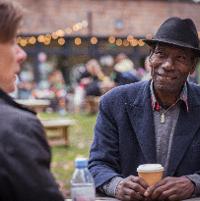It has been now almost a year and three months since with the first lockdown when most of the western world began a period of social distancing. Despite the new COVID variants, vaccination campaigns have been sufficiently successful to enable societies to plan for imminent re-opening. Many of us will have experienced loneliness over this time, and this will no doubt stimulate a debate about how best to respond this problem in the more vulnerable populations such as the elderly. For many older people of course, loneliness was a feature of life before the pandemic.
Based on the research conducted for my book Practical Friendship my hunch is that the Alpha course of the Anglican Church could offer a much better recipe or template for fostering connection and reintegrating lonely people into society than the many befriending services that sprung up to address the immediate need during the pandemic. So here’s how it might work.
The idea would be to run ‘connection courses’ in which groups of people of 40 to 100 would be brought together once a week in a community centre or a hosting church. Allocated to tables of 6-8 people each with a trained leader or facilitator, the participants would typically start with some general social chat and a light meal, before turning to the theme of the evening. Over a course of 8-12 weeks, activities such as practicing introductions, using board games such as ‘Therapy’ to engage in self disclosure, discussing themes of friendship traits necessary for good relationship building and others would allow participants to bond slowly with age peers. For the participants it should be a light and enjoyable programme, but it is structured in such a way as to allow each participant to make six or more general acquaintances and select one or two participants to build a free and voluntary initial relationship. Courses might last up to 25 hours but minimally 15h, which (ideally) should take participants past the threshold from acquaintance to potential friend. The course would incorporate ‘lessons’ on managing rejection, showing interest in others, taking time to open up to others, interacting in a group setting, initiating follow-up meetings (a coffee or a beer), and the lessons are to be understood as ‘learning by doing’. But the key lesson is the experience that they can, with limited effort and time, make a new friend.
By staging a hobby bazaar in the second half of the course, participants would be able to get to know individuals outside their immediate circle (the allotted tables) and identify shared interests. The leaders or facilitators could include Guided Feedback sessions (I’m still following the connection course template) at various points in the course to address any issues that might put obstacles in the way of further bonding.
It might even be possible (though obviously this is a considerable extra expense) to have a weekend away at the end of the course – provided that the group members are not judged too vulnerable. This kind of event is not only well recognised by all sorts of organisations as a powerful relationship enhancer and friendship fortifier, but it has acquired an established place in various kinds of therapy programme.
For sure there are various challenges and potential problems that have to be managed or prepared for: sex-segregation for tables? religious or cultural diversity in the groups? time slot management and transport management to make it accessible not just to the elderly but also current (working) community population?
Still, I would suggest that the Anglican church has shown that courses like this are easily scalable and replicable in various locations, so that organisations addressing loneliness can ‘copy with pride’.
About the Author:
Christian Langkamp is a Visiting Academic at the Oxford Institute of Population Ageing, researching friendship maintenance habits in midlife and third age. A preliminary version of his book ‘Practical Friendship’ is published online at www.practicalfriendship.com and can be downloaded for free.
Opinions of the blogger is their own and not endorsed by the Institute
Comments Welcome: We welcome your comments on this or any of the Institute's blog posts. Please feel free to email comments to be posted on your behalf to administrator@ageing.ox.ac.uk or use the Disqus facility linked below.













